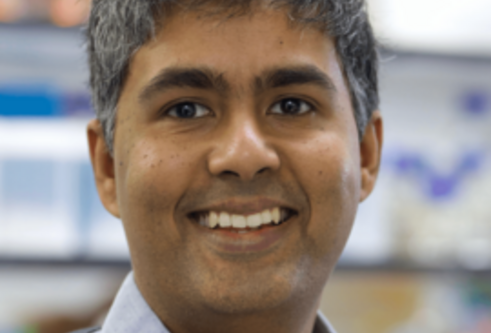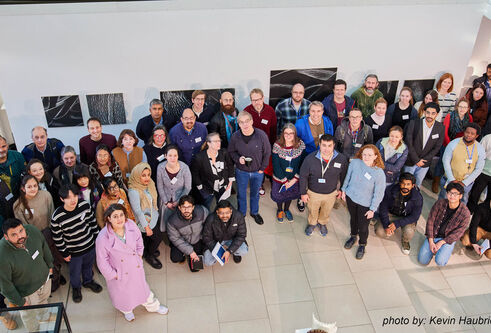
Contact
Biography
Yogesh graduated with a Bachelor’s degree in Chemical Engineering in 2000 from Birla Institute of Technology and Science (BITS), Pilani, India. He then went on to do a PhD in Immunology at the Max Planck Institute of Immunobiology and University of Freiburg in Germany under the supervision of Prof. Michael Reth, where he worked on B cell antigen receptor signalling and protein tyrosine kinase regulation. To apply structural biology methods to study cell signalling, Yogesh moved to Cambridge in 2009 to work at the MRC Laboratory of Molecular Biology. He was awarded a Marie Curie Intra-European Fellowship and an EMBO Long term fellowship to work on the structural basis driving linkage specificity in ubiquitin binding domains and in the ovarian tumour (OTU) family of deubiquitinases.
In February 2013, Yogesh relocated to the MRC PPU to establish his research program, focussing on ubiquitin signalling mechanisms. His research focusses on the mechanisms by which cells maintain protein homeostasis. Failure to degrade proteins in a timely manner is the underlying cause of diseases such as cancer and neurodegeneration. By studying how ubiquitylation regulates protein degradation and proteostasis they hope to better understand the molecular causes of disease that can be exploited for the development of effective therapeutic strategies.
In 2015 Yogesh received a prestigious ERC Starting Grant to investigate the function of ubiquitin and ubiquitin-like modifiers regulating T lymphocyte biology. He was selected as a EMBO Young Investigator in 2015. Yogesh is a recipient of the Lister Prize in 2017 from the Lister Institute of Preventive Medicine. In 2021 he received an ERC Consolidator Grant to investigate how branched ubiquitin signals function as priority signals in cellular stress responses. In 2022, he was made the Professor of Cellular Biochemistry.
Research
Our laboratory is interested in understanding how signal transduction is mediated in cells by the posttranslational modification of proteins. A primary focus of the lab is the ubiquitin system where the attachment of ubiquitin can alter the function and fate of the modified protein. By using a multidisciplinary approach, we aim to get mechanistic insights into how fundamental cellular processes are modulated by ubiquitylation to maintain cellular homeostasis. Of late, we have also expanded our research into the poorly studied ubiquitin-like modifier UFM1 which is essential for protein biogenesis and endoplasmic reticulum homeostasis. We aim at getting detailed biochemical and molecular insights into these processes by focussing on the enzymes that add the modification, modules that recognize and decode the modification, and proteases which remove them.
At present, we have 3 focus areas of research in the lab:
- How do different ubiquitin signals couple to different signalling outcomes and how is ubiquitylation regulated by Deubiquitinases (DUBs)?
- How are proteins modified with UFM1 and why is this modification essential to maintain ER homeostasis?
- How are the IRAK kinases activated and regulated in innate immune signalling?
Selected Recent Publications
- Mahklouf L, Peter JJ, Magnussen H, Thakur R, Millrine D, Minshull TC, Harrison G, Varghese J, Lamoliatte F, Foglizzo M, Macartney T, Calabrese AN, Zeqiraj E and Kulathu Y. (2024) The UFM1 E3 ligase recognizes and releases 60S ribosomes from ER translocons. Nature. 627(8003):437-444.
- DaRosa PA, Penchev I, Gumbin SC, Scavone F, Wąchalska M, Paulo JA, Ordureau A, Peter JJ, Kulathu Y, Harper JW, Becker T, Beckmann R and Kopito RR. (2024) UFM1 E3 ligase promotes recycling of 60S ribosomal subunits from the ER. Nature. 27(8003):445-45.
- Lange SM, McFarland MR, Lamoliatte F, Kwasna D, Shen L, Wallace I, Cole I, Armstrong L, Knebel A, Johnson C, De Cesare V and Kulathu Y. (2024) Comprehensive approach to study branched ubiquitin chains reveals roles for K48-K63 branches in VCP/p97-related processes. Nature Structural & Molecular Biology
- Millrine D, Peter JJ and Kulathu Y. (2023). A guide to UFMylation, an emerging posttranslational modification. FEBS J.
- Peter JJ, Magnussen HM, DaRosa PA, Millrine D, Matthews SP, Lamoliatte F, Sundaramoorthy R, Kopito R and Kulathu Y. (2022) A non-canonical scaffold-type ligase complex mediates protein UFMylation. EMBO Journal. 41(21):e111015.
- Milrine D, Cummings T, Matthews SP, Peter JJ, Magnussen H, Maccartney T, Lamoliatte F, Knebel A and Kulathu Y. (2022) Human UFSP1 is an active protease that regulates UFM1 maturation and UFMylation. Cell Reports. 40(5):111168
- Lange SM, Armstrong L, Kulathu Y. (2022) Deubiquitinases: from mechanisms to their inhibition by small molecules. Molecular Cell 82(1):15-29
- Abdul Rehman SA, Armstrong LA, Lange SM, Kristariyanto YA, Grawert TW, Knebel A, Svergun DI and Kulathu Y. (2021) Mechanism of activation and regulation of Deubiquitinase activity in MINDY1 and MINDY2. Molecular Cell 81(20): 4176-4190.
- Lange SM, Nelen MI, Cohen P, Kulathu Y. (2021) Dimeric Structure of the Pseudokinase IRAK3 Suggests an Allosteric Mechanism for Negative Regulation. Structure. 29(3):238-251
- Dominika Kwasna, Syed Arif Abdul Rehman, Jayaprakash Natarajan, Stephen Matthews, Ross Madden, Virginia De Cesare, Simone Weidlich, Satpal Virdee, Ivan Ahel, Ian Gibbs-Seymour, Yogesh Kulathu (2018) Discovery and Characterization of ZUFSP/ZUP1, a Distinct Deubiquitinase Class Important for Genome Stability. Molecular Cell. 70(1) 150-164.e6
- Kristariyanto, Y. A., Abdul Rehman, S. A., Weidlich, S., Knebel, A. and Kulathu, Y. (2017) A single MIU motif of MINDY-1 recognizes K48-linked polyubiquitin chains. EMBO Reports. 18 392-402
- Leznicki P and Kulathu Y. (2017) Mechanisms of regulation and diversification of Deubiquitylating enzyme function J Cell Sci. 130 (12): 1997-2006.
- Abdul Rehman, S. A., Kristariyanto, Y. A., Choi, S. Y., Nkosi, P. J., Weidlich, S., Labib, K., Hofmann, K. and Kulathu, Y. (2016) MINDY-1 Is a Member of an Evolutionarily Conserved and Structurally Distinct New Family of Deubiquitinating Enzymes. Molecular Cell 63 146-155
- Kristariyanto, Y. A., Abdul Rehman, S. A., Campbell, D. G., Morrice, N. A., Johnson, C., Toth, R., Kulathu, Y. (2015) K29-selective ubiquitin binding domain reveals structural basis of specificity and heterotypic nature of k29 polyubiquitin Molecular Cell 58 83-94
- Kristariyanto, Y. A., Choi, S. Y., Rehman, S. A., Ritorto, M. S., Campbell, D. G., Morrice, N. A., Toth, R., Kulathu, Y. (2015) Assembly and structure of Lys33-linked polyubiquitin reveals distinct conformations Biochem J 467 345-352
Awards
| Award | Year |
|---|---|
| Major Personal Funding Awards / ERC Consolidator Grant | 2020 |
| Major Personal Funding Awards / Lister Research Prize | 2017 |
| International Science Prizes awarded since 1990 / European Molecular Biology Organisation Young Investigator Programme | 2016 |
| Major Personal Funding Awards / ERC Starting Grant | 2015 |
| International Science Prizes awarded since 1990 / Marie Curie Intra European Fellowship | 2010 |
| Personal Fellowships / EMBO Long-Term Fellowship | 2009 |
Stories
Press release
A critical new understanding of how cells control the production of proteins that dot the surface of cells has been unveiled in a groundbreaking new study

News
A one day symposium for the Scottish cryo-EM community took place on 30 November 2023

News
Nick Brewer, Ian Ganley, and Yogesh Kulathu have been promoted to Personal Chair (Professor) as part of the 2022 Annual Review process for academic staff.
